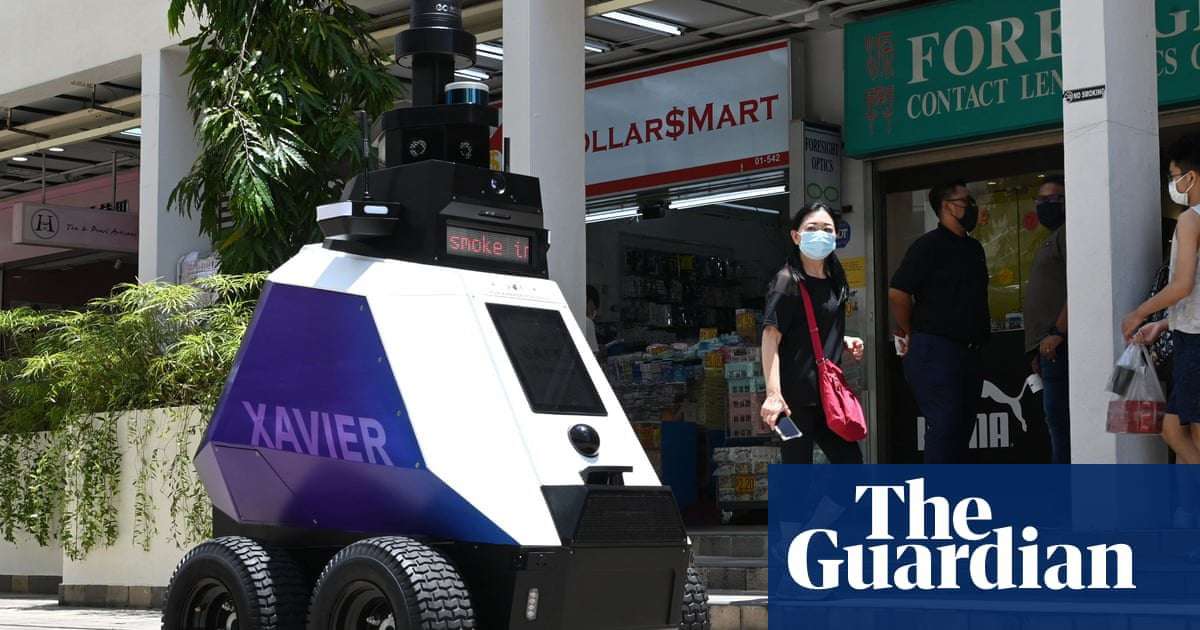Singapore has trialled patrol robots that blast warnings at people engaging in “undesirable social behaviour”, adding to an arsenal of surveillance technology in the tightly controlled city-state that is fuelling privacy concerns.
From vast numbers of CCTV cameras to trials of lampposts kitted out with facial recognition tech, Singapore is seeing an explosion of tools to track its inhabitants.
That includes a three-week trial in September, in which two robots were deployed to patrol a housing estate and a shopping centre.
Officials have long pushed a vision of a hyper-efficient, tech-driven “smart nation”, but activists say privacy is being sacrificed and people have little control over what happens to their data.
Singapore is frequently criticised for curbing civil liberties and people are accustomed to tight controls, but there is still growing unease at intrusive tech.
The government’s latest surveillance devices are robots on wheels, with seven cameras, that issue warnings to the public and detect “undesirable social behaviour”.
This includes smoking in prohibited areas, improperly parking bicycles, and breaching coronavirus social-distancing rules.
During a recent patrol, one of the “Xavier” robots wove its way through a housing estate and stopped in front of a group of elderly residents watching a chess match.
“Please keep one-metre distancing, please keep to five persons per group,” a robotic voice blared out, as a camera on top of the machine trained its gaze on them.
Frannie Teo, a 34-year-old research assistant, was walking through the mall during the recent robot patrol trial.
“It reminds me of Robocop,” she said.
It brings to mind a “dystopian world of robots ... I’m just a bit hesitant about that kind of concept,” she added.
Digital rights activist Lee Yi Ting said the devices were the latest way Singaporeans were being watched.
“It all contributes to the sense people ... need to watch what they say and what they do in Singapore to a far greater extent than they would in other countries,” she told Agence France-Presse.
But the government defended its use of robots, saying they were not being used to identify or take action against offenders during the tech’s trial, and were needed to address a labour crunch as the population ages.
“The workforce is actually shrinking,” said Ong Ka Hing, from the government agency that developed the Xavier robots, adding they could help reduce the number of officers needed for foot patrols.
The island of about 5.5 million people has 90,000 police cameras, a number set to double by 2030, and facial recognition tech – which helps authorities pick out faces in a crowd – may be installed on lampposts across the city.
There was a rare public backlash this year when authorities admitted coronavirus contract-tracing data collected by an official system had been accessed by police. The government later passed legislation to limit its use.
But critics say the city-state’s laws generally put few limitations on government surveillance, and Singaporeans have little control over what happens to the data collected.
“There are no privacy law constraints on what the government can or cannot do,” said Indulekshmi Rajeswari, a privacy lawyer from Singapore who is now based in Germany.

loptr on October 6th, 2021 at 10:38 UTC »
I don't get it, isn't this literally the hallmark of a surveillance state?
Why does the headline say "stoke" rather than "confirms"?
Pristine-Emu9984 on October 6th, 2021 at 09:14 UTC »
That would have a traffic cone put on it in minutes in the UK.
Dan_From_Japan on October 6th, 2021 at 09:08 UTC »
Send one of these to Philly, see what happens